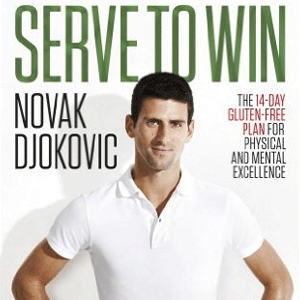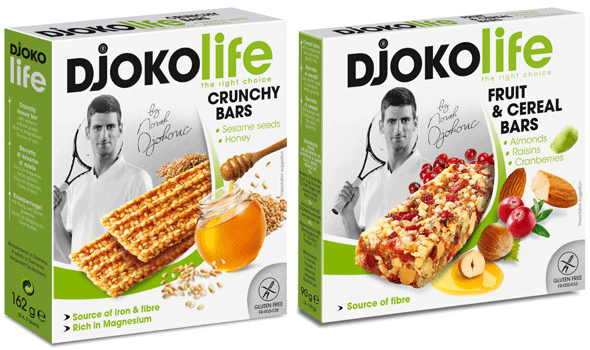
Novak Djokovic, has been called the greatest tennis player of all time, but his success has not always come easily.
The Serbian has had to battle a myriad health setbacks and played through enormous physical difficulties to reach the top.
The solution to his health problems? Simple, he stopped eating foods containing gluten. Up until about 5 years ago Djokovic was suffering from respiratory problems and recurring illness, which included sports-induced asthma, chest pains and chronic fatigue which saw him frequently collapse on court.
In January 2014 he laid his whole health life bare in his book Serve to Win: The 14-Day Gluten-free Plan for Physical and Mental Excellence, where he describes his journey that came about by simply listening to his body.
Novak Djokovic grew up in the remote mountain village of Kopaonik in rural Serbia where his parents owned a pizzeria. Although tennis was an unknown sport in the region, Novak got hooked on the sport by watching Pete Sampras on television. So much so that his father relented and bought him a tennis racquet.
Around the age of 19, despte giving tennis his all, he felt that something was physically wrong with him. His doctors put it down to allergies, or exercise-induced asthma, or simply being out of shape. Whatever it was, nobody could fix it.
His exercise regime consisted of weight lifting, biking, running and doing stretches, day in and day out, so he could not have been unfit.
He persevered through the mind fog and fatigue to win numerous matches and even championships, but there were also occasions where he collapsed on court (for example during his first US Open, playing against Gael Monfils).
In 2008 US tennis player Andy Roddick made fun of the fact that he so often fell ill. "Two injured ankles, hip . . . knee . . . cramps, bird flu, anthrax, SARS, common cough and cold" he jeered, while Swiss player Roger Federer remarked "I think he's a joke, you know, when it comes down to his injuries."
Djokovic says his professional and personal low came during an Australian Open match in January 2010 when he collapsed while playing against Frenchman Jo-Wilfried Tsonga.
Read: When stress causes gluten intolerance and how to handle it
How the healing began
In his book the tennis player describes how an alternative therapist from his home country, Dr Igor Cetojevic, was watching him play and saw him collapse. Dr Cetojevic guessed that food was the reason why the tennis player couldn't breathe well, and that it had to do with an "inbalance in his digestive system that was causing a buildup of toxins in his intestines.'
The two met up n July 2010 at the Davis Cup in Split, Croatia.
Cetojevic is, according to the bio on his website, a medical doctor and acupuncturist and had qualified at the Medical University of Sarajevo in 1988. He studied Chinese Traditional Medicine at The European Center for Peace and Development in Belgrade, Yugoslavia and holds a diploma from The Indian Institute of Magnetotherapy in New Delhi.
During a visit to South Africa in 2001 Cetojevic was introduced to the 'revolutionary tool' QXCI Biofeedback. In an exclusive interview with Gulf News Cetojev explained that he connected the straps of a biofeedback device to Djokovic's wrists and forehead to measure stress, environmental toxins, brainwaves and food allergies.
Cetojevic said: “I found that he was very sensitive to gluten, a protein present in wheat, one of the most common foods in Novak’s diet.
Just eighteen months later Djokovic was a different man. Eleven pounds lighter and stronger than ever, he was sleeping better and had boundless energy. He says he feels healthier than he'd been since early childhood and he indeed went went on to achieve his two life goals: to win Wimbledon and to be named the number one tennis player in the world.
All he did, on Cetojevic's advice, was eliminate gluten from his diet, which meant cutting out bread and pasta, which are staples of the Serbian diet, as well as his beloved pizza. After a few weeks on a gluten-free diet he cut down on sugar, and then cut out dairy.
Read: More on gluten sensitivity
What Djokovic eats and why
In his book Djokovic says that he starts his day with a glass of room-temperature water (cold water slows down the digestive system and diverts blood from his muscles) and a couple of spoonfuls of raw honey. For breakfast it’s a bowl of gluten-free oatmeal, and the rest of his diet consists of nuts, seeds, fruit, coconut oil, and rice or almond milk or coconut water.
He also eats lots of vegetables, gluten-free pasta, avocado, cashew butter, salads, quinoa and lean protein such as salmon or chicken. He avoids caffeine and alcohol during tournaments.
Djokovic maintains that modern wheat is capable of ruining digestive health, causing conditions ranging from acid reflux to ulcerative colitis and other forms of abdominal distress.
In the foreword to Djokovic's book, Dr William Davis of wheatbellyblog.com says ingesting gluten-rich foods can trigger inflammation, which is common joint stiffness and pain, autoimmune conditions such as rheumatoid arthritis and Hashimoto's thyroiditis and unmasks or worsens psychiatric conditions such as paranoia or schizophrenia.
Read: The anti-inflammatory diet
He says it causes weight gain, particularly around the abdomen, because of its unique appetite-stimulating effect, making even athletes who train hours each day overweight. It impairs sports performance by provoking any of these, as well as mind fog, fatigue and it plays havoc with the hormones.
In May 2015 Novak Djokovic launched the DJOKOlife range of nutrition products that reflect Novak’s food philosphy and include seed biscuits, crunchy toasts with rice flour and oats, honey and sesame seed bars, fruit and cereal bars and a vegetable drink.

Is going gluten-free for everybody?
The way of eating is not unlike what sports science guru Tim Noakes advocates, and who himself has brought himself back from the brink of type 2 diabetes by cutting out carbohydrates from his diet. According to Noakes there are two types of people: those who can metabolise carbohydrates effectively and those who can't.
Health24's DietDoc says that in the case of "allergens" like gluten it is important to distinguish between allergy and sensitivity/intolerance. If someone has a genuine gluten allergy (coeliac disease), gluten will make you really ill and you have to studiously avoid of all foods that contain gluten. A blood test in this instance will show that you have Coeliac disease.
Read: The difference between gluten intolerance, allergy and hypochondira
If the person doesn't have coeliac disease but suffers from symptoms apparently related to gluten, she says, they may have "non-coeliac gluten sensitivity". This means that they may have symptoms similar to people who cannot tolerate gluten but don't have the same antibodies and intestinal damage as seen in coeliac disease.
German tennis player Sabine Lisicki, The Garmin cycling team, marathon runner Anna Medaris Miller, Olympic swimming champ Dana Vollmer and American long distance runner Amy Yoder Begley are just a couple of star athletes who have gone gluten-free and have seen huge gains in physical wellness as well as performance.
But, going gluten-free may not help all athletes reach and maintain peak performance. If they do find they are experiencing similar symptoms, as Djokovic did, going gluten-free with the help of a qualified dietician may be well worth trying. They can also start their journey by asking Health24's DietDoc.
Watch: Novak Djokovic collapses after a long rally against Rafael Nadal, Australian Open, 2012.
Read:
Tips for managing gluten allergy
Foods you can eat if you're avoiding gluten
Gluten-free may not improve athletic performance




 Publications
Publications
 Partners
Partners














